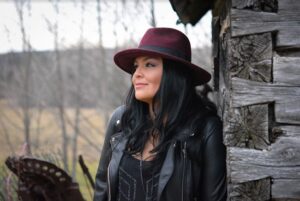Multi Juno Award-winning blues artist gears up for new album release

By Colin Graf
NASHVILLE— Winning Juno Awards number six and seven this June felt like “crossing the finish line of a really, really long race,” says singer Crystal Shawanda of Wiikwemkoong Unceded Territory.
After people told her she was “committing career suicide” by switching from being an established country singer in the USA with a top-20 hit to follow her heart’s desire singing the blues, winning two of Canada’s premier music awards felt like an affirmation of that decision, she says.
“It was a big thrill for me and I was very thankful,” Shawanda shares from her Nashville home where she and husband, guitarist, and producer Dewayne Strobel and four-year-old daughter Zhaa Zhaa have been riding out the COVID-19 global pandemic.
She was awarded Juno Awards for Indigenous Artist of the Year and Blues Album of the Year at a virtual award ceremony on June 6.
Shawanda and her family were in Canada when the border was closed in Mar. 2020, and the award-winning album, Church House Blues, was released with a promo reel video they filmed themselves on Manitoulin Island in and near her home community. They got back to Nashville at the end of May last year. Still, they quickly re-tooled and launched a new kind of music career, preparing virtual shows, lasting from one song to an hour in length, for sale online to various buyers for virtual events. Eventually, Shawanda and Strobel found they were recording up to four shows a week, mostly as a duo, complete with personalized messages and nods to each event’s sponsors.
“It’s been really comfortable for us,” the singer says. “We can just sit and work there for hours and hours.”
Zhaa Zhaa sometimes joins them there, sitting with her mother as she sings, and is starting to work on her own musical career.
“We’ve worked her into the virtual shows,” Shawanda explains. “She’s got it nailed down.”
Zhaa Xhaa duets with Crystal, singing the choruses in Shawanda’s first country hit, You Can Let Go Now.
Shawanda’s father looks after his granddaughter on tour, and he has told them the child wants to be on stage with them.
“So we’ve just started letting her come out. She’s so happy and loves it,” she says.
For the awards night, the family kept things casual with pizza and doughnuts, Shawanda says. When the announcement was made, Zhaa Zhaa was “so excited and that made me more excited. I’ve kind of forgotten how to be that excited; I couldn’t stop laughing and crying,” Shawanda recalls.
All of the blues nominees had a group chat set up for them by the Juno organizers and she found it a great experience, with all keeping in touch in the weeks prior to the award ceremony, showing “mutual respect and admiration for each other.”
While the fully-vaccinated musical couple has done some travelling for photoshoots for the new album, the pair has also been doing Zoom school shows for students who are learning online, and Crystal has guested on panel discussions as an artist, producer, and owner of her own music label.
The new, as-yet-untitled album, expected to be released later this year, is mostly co-written by Shawanda and Strobel, and most have “a really feel-good vibe.” Although they weren’t intentionally trying for that positive feel on the album, “we had a lot of joy in our tiny family” in the past year, and that seems to have driven the song-writing, she says.
“Even the sad songs are hopeful.”
Strobel is producing as well as playing guitar.
While the title track from Shawanda’s Juno-winning 2020 album, Church House Blues, recalls how Black American musicians often sang and played the blues in bars on Saturday nights and then turned around and did the same in church on Sunday, it has taken on new depth and poignancy with the recent discovery of hundreds of unmarked graves at the sites of former church-run residential schools in Canada, she says.
“The title of that song is a message,” Shawanda explains. “I was born out of church house blues, and a lot of us are.”
The recent news confirms what First Nations families already knew, she says. “We grew up on these stories,” such as that of her mother’s cousin “who didn’t make it home” from residential school.
“They never sent his body back, so his mother never got to grieve properly and have closure and say goodbye or have a proper service for him.”
Shawanda describes herself as “one of the lucky ones” because her parents “worked very hard to heal their wounds” and give her a good childhood. While her parents grew up surrounded by alcoholism, they managed to break the chain of intergenerational trauma by looking for the resources that were offered in the community, she explains.
“I grew up really blessed because my parents wanted to show me a different way, a different life, loving and very nurturing. That’s why I had the confidence to say I want to go to Nashville and become a singer.”
She sees hope for the future, in spite of the grim findings. She thinks non-Indigenous Canadians, learning about the Indian Residential School legacy, will be showing more support.
“When someone sees an Indigenous person struggling with life, there’s a reason behind that and it goes way deeper than what’s on the surface,” she says.


